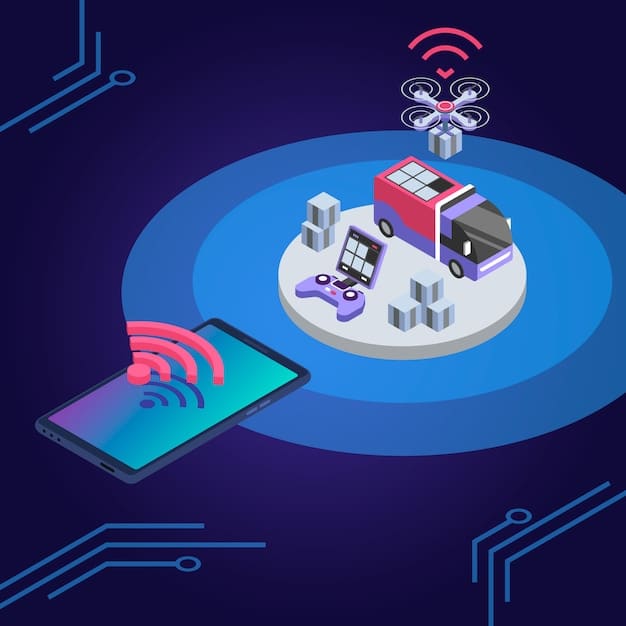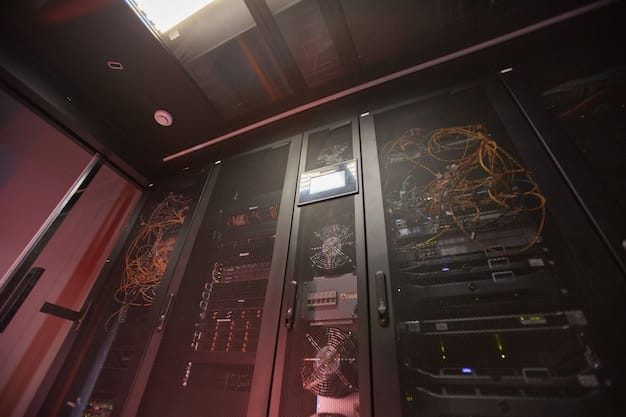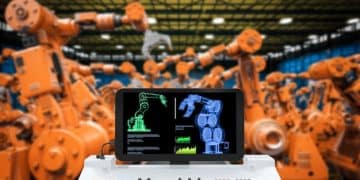US IoT Startups: Connecting Devices, Transforming Industries

The Internet of Things (IoT) is a rapidly evolving technological landscape where US startups are at the forefront, developing innovative solutions that connect devices and transform industries, from smart homes to industrial automation, fundamentally altering how we interact with our environment and conduct business.
In the expansive and ever-evolving realm of technology, few concepts have captured the imagination and disrupted traditional paradigms quite like the Internet of Things (IoT) – How US Startups are Connecting Devices and Transforming Industries. This interconnected network of physical objects embedded with sensors, software, and other technologies enables them to connect and exchange data with other devices and systems over the internet. The United States has emerged as a fertile ground for the prolific growth of IoT, with a vibrant ecosystem of startups leading the charge in innovation. These entrepreneurial ventures are not merely developing new gadgets; they are fundamentally reshaping industries, enhancing efficiency, and creating unprecedented opportunities across various sectors.
The Genesis of IoT: A Brief Overview
The concept of connecting everyday objects to the internet has roots stretching back to the early days of personal computing and networking. However, the term “Internet of Things” itself was coined by Kevin Ashton in 1999, envisioning a future where physical objects could collect and share data, leading to a more efficient and responsive world. What began as a theoretical concept has rapidly transitioned into a tangible reality, largely fueled by advancements in microelectronics, ubiquitous internet connectivity, and the proliferation of cloud computing.
The journey from concept to widespread adoption has been a progressive one, marked by key technological breakthroughs. Miniaturization of sensors made it possible to embed them into a vast array of devices, from household appliances to industrial machinery. Simultaneously, improvements in wireless communication protocols, such as Wi-Fi, Bluetooth, and eventually 5G, provided the necessary infrastructure for these devices to communicate seamlessly. The advent of powerful cloud computing platforms offered the backbone for processing and storing the immense volumes of data generated by IoT devices, making analysis and actionable insights possible.
This evolution has not been without its challenges, primarily concerning data privacy, security, and interoperability. However, the continuous pursuit of innovation by startups, often unburdened by legacy systems, has been instrumental in addressing these hurdles. Their agile nature allows them to experiment with novel solutions, pushing the boundaries of what is possible and quickly adapting to emerging needs. The collaborative environment within the US tech ecosystem, coupled with access to venture capital, further accelerates this developmental pace, positioning American startups at the forefront of the global IoT revolution.
Today, IoT is no longer a niche technology but a pervasive force, impacting everything from urban planning to personal health. The initial foundational innovations have paved the way for increasingly sophisticated applications, demonstrating the immense potential of a truly interconnected world. Understanding this genesis is crucial to appreciating the current impact and future trajectory of IoT, especially as driven by entrepreneurial zeal.
Key Sectors Transformed by US IoT Startups
The transformative power of IoT is not confined to a single domain; rather, it permeates diverse sectors, revolutionizing operations and creating new value propositions. US startups are playing a pivotal role in this widespread disruption, tailoring IoT solutions to the unique demands of various industries.
Smart Homes and Cities: Redefining Urban Living
The concept of smart living spaces and urban environments is rapidly evolving thanks to IoT innovations. Startups are developing devices and platforms that enhance comfort, security, and energy efficiency in homes, while simultaneously creating more sustainable and responsive cities.
- Home Automation: Smart thermostats, lighting systems, and security cameras learn user preferences, reducing energy consumption and enhancing safety.
- Urban Infrastructure: Sensor-laden streetlights, smart parking systems, and waste management solutions optimize resource allocation and improve public services.
These applications aim to integrate technology seamlessly into daily life, making environments more intuitive and efficient. The focus is on creating ecosystems where devices communicate effortlessly to serve human needs, leading to significant improvements in quality of life and operational costs for municipalities.
Healthcare and Wearables: A New Era of Personalized Care
IoT is ushering in a paradigm shift in healthcare, moving from reactive treatment to proactive wellness management. Wearable devices and connected medical equipment allow for real-time monitoring and personalized interventions, empowering both patients and healthcare providers.
From smartwatches tracking vital signs to continuous glucose monitors for diabetics, these devices collect crucial health data that can be used for early detection of issues, chronic disease management, and even remote consultations. Startups are at the forefront of creating these non-invasive, continuous monitoring solutions, which promise to alleviate the burden on traditional healthcare systems and improve patient outcomes substantially. The focus is on preventative care and empowering individuals to take a more active role in their health management, leading to better long-term health and reduced medical expenditures.
Industrial IoT (IIoT): Revolutionizing Manufacturing and Logistics
The application of IoT in industrial settings, often referred to as IIoT, is creating the fourth industrial revolution (Industry 4.0). US startups are deploying sophisticated sensor networks and analytical tools to optimize complex industrial processes, leading to unprecedented levels of efficiency and productivity.
- Predictive Maintenance: Sensors on machinery detect anomalies, allowing for maintenance before breakdowns occur, minimizing downtime and saving costs.
- Supply Chain Optimization: Real-time tracking of goods, inventory management, and route optimization enhance logistical efficiency and reduce waste.
These innovations are not just about automation; they are about creating “smart factories” where machines communicate with each other and with human operators, enabling a more integrated and responsive production environment. The aim is to create intelligent ecosystems that can self-optimize and adapt to changing conditions, significantly boosting operational excellence and competitive advantage across the manufacturing and logistics sectors.
Challenges and Opportunities for US IoT Startups
While the IoT landscape presents immense opportunities for innovation and growth, it is also fraught with significant challenges that US startups must navigate. These hurdles often involve complex issues related to technology, regulation, and market acceptance, but they concurrently open doors for unique solutions and competitive advantages.
Data Security and Privacy Concerns
One of the most pressing concerns in the IoT ecosystem is the sheer volume of data generated, coupled with the critical need to protect sensitive information. As more devices become interconnected, the attack surface for cyber threats expands exponentially, making data breaches a constant risk. Startups in this space must prioritize robust security measures from the outset, embedding privacy-by-design principles into their products and services.
The challenge extends beyond technical safeguards to regulatory compliance. Different jurisdictions have varying data protection laws, such as GDPR in Europe and state-specific regulations in the US, requiring startups to be agile in adapting their practices. Overcoming these security and privacy hurdles is not just a regulatory obligation but also a fundamental building block for building user trust, which is paramount for widespread IoT adoption. Startups that can demonstrably offer superior data security and privacy solutions will undoubtedly gain a significant edge in the market.
Interoperability and Standardization
The diverse nature of IoT devices, originating from a multitude of manufacturers and utilizing various communication protocols, leads to significant interoperability challenges. Devices from one ecosystem may not seamlessly communicate with those from another, hindering widespread adoption and creating fragmented user experiences. This lack of universal standards complicates development, increases costs, and can deter consumers and businesses from investing heavily in IoT solutions.

For startups, this presents both a problem and an opportunity. Those that can develop solutions that bridge these interoperability gaps, perhaps through flexible software platforms or open-source initiatives, stand to gain significant market share. Contributions to industry-wide standardization efforts could also position them as thought leaders and key enablers of a more cohesive IoT future. The drive towards more open and compatible systems is critical for the long-term scalability and success of the IoT industry as a whole.
Monetization Models and Scalability
Developing innovative IoT products is only half the battle; establishing sustainable and scalable monetization models is equally crucial for startup survival and growth. Initial revenue streams might come from hardware sales, but the long-term value often lies in recurring services, data analytics, or platform subscriptions. Finding the right balance between hardware costs, subscription fees, and perceived value to the customer can be a delicate act.
Furthermore, scaling IoT solutions involves not just manufacturing more devices but also managing large-scale data processing, maintaining infrastructure, and providing continuous customer support. This requires significant investment in cloud capabilities, AI/ML for data insights, and robust operational teams. US startups, with their access to venture capital and a culture of rapid scaling, are uniquely positioned to tackle these challenges, provided they can articulate a clear path to profitability and demonstrate a compelling return on investment for their users.
Case Studies: US Startups Leading the IoT Charge
To truly understand the impact of US startups in the IoT space, examining specific examples of pioneering companies is essential. These enterprises exemplify the innovation, tenacity, and forward-thinking approaches driving the industry forward, tackling diverse problems with interconnected solutions.
Companies in Smart Home Integration
The smart home sector is an arena of intense competition, yet several US-based startups have carved out significant niches by offering unique and compelling solutions that go beyond simple remote control. These companies focus on enhancing convenience, security, and sustainability within residential environments.
Take for instance, a startup specializing in AI-driven energy management for homes. Rather than just adjusting thermostats, their system learns household routines and weather patterns, optimizing energy consumption in real-time across various appliances. This holistic approach not only saves homeowners money but also reduces their carbon footprint, addressing a growing consumer desire for environmental responsibility. Their success lies in seamless integration with existing smart home ecosystems and a focus on intuitive user experience, making advanced technology accessible to the everyday consumer.
Innovators in Industrial IoT (IIoT) Solutions
In the industrial domain, startups are often confronted with complex legacy systems and stringent reliability requirements. Nevertheless, a number of US companies are making significant strides in transforming manufacturing, logistics, and critical infrastructure through cutting-edge IIoT applications.

Consider a startup developing edge computing solutions for factories. Their technology allows data processing to happen closer to the source (i.e., on the factory floor) rather than sending all data to the cloud. This reduces latency, enhances security, and enables faster decision-making for critical industrial processes. By focusing on niche but high-impact areas like predictive maintenance for specialized machinery or real-time quality control in assembly lines, these startups demonstrate how targeted IoT applications can yield massive efficiency gains and cost savings for large enterprises, positioning them as essential partners in the industrial digital transformation.
Breakthroughs in Healthcare IoT
The healthcare industry, traditionally slower to adopt new technologies, is now rapidly embracing IoT thanks to startups pushing the boundaries of remote patient monitoring, diagnostics, and personalized medicine. Their innovations are designed to improve patient outcomes, reduce healthcare costs, and expand access to care.
For instance, a startup might specialize in developing smart patches that continuously monitor vital signs for elderly patients, transmitting data directly to caregivers or medical professionals. This enables proactive intervention in case of abnormalities, preventing hospital readmissions and allowing patients to age in place more safely. Another example could be a company creating ingestible sensors for gastrointestinal diagnostics, offering a less invasive and more accurate way to gather internal health data. These companies often combine hardware innovation with sophisticated data analytics and AI to translate raw sensor data into actionable insights, proving that IoT’s potential in healthcare is profound and life-changing.
These case studies underscore a common theme: successful US IoT startups aren’t just building technology; they are solving real-world problems with innovative, scalable, and often ethically conscious solutions, pushing the boundaries of what connected devices can achieve across various critical sectors.
The Future of IoT: Trends and Predictions
As the Internet of Things continues its rapid evolution, several key trends are emerging that will shape its future trajectory. For US startups, understanding these shifts is crucial for identifying new opportunities and staying ahead in a competitive market. The landscape is dynamic, with technological advancements and changing consumer expectations driving continuous innovation.
Edge Computing and AI Integration
One of the most significant trends is the increased shift towards edge computing, where data processing happens closer to the source of data generation, rather than solely relying on centralized cloud servers. This reduces latency, conserves bandwidth, and enhances data security. For IoT devices, which often collect massive amounts of data, processing at the edge allows for real-time decision-making, critical for applications like autonomous vehicles and industrial automation. Paired with this is the growing integration of Artificial Intelligence (AI) and Machine Learning (ML) directly into IoT devices and edge platforms. This allows devices to not only collect data but also to analyze it, learn from patterns, and even make autonomous decisions without constant human intervention. Startups focusing on AI-powered edge solutions will be at the forefront of the next wave of IoT innovation.
5G’s Transformative Impact
The widespread deployment of 5G networks is poised to be a game-changer for IoT. 5G offers significantly faster speeds, lower latency, and the capacity to support a much higher density of connected devices compared to previous generations of cellular technology. This will unlock new possibilities for IoT applications that require real-time communication and massive data transfer, such as smart city infrastructure, enhanced telehealth services, and highly automated industrial systems. For startups, 5G presents an opportunity to develop more sophisticated and responsive IoT products and services that were previously hindered by network limitations. The enhanced connectivity will facilitate more complex interactions between devices and enable truly pervasive IoT ecosystems.
Sustainability and Ethics in IoT
As IoT becomes more pervasive, concerns about its environmental impact (e.g., energy consumption, electronic waste) and ethical implications (e.g., data privacy, algorithmic bias) are gaining prominence. The future of IoT will increasingly demand solutions that are not only technologically advanced but also sustainable and ethically responsible. This means designing devices that are energy-efficient, promoting circular economy principles for hardware, and ensuring transparent and fair data practices. Startups that embed sustainability and ethical considerations into their core business models and product development from the outset will resonate more strongly with conscious consumers and increasingly stringent regulatory frameworks. This shift represents a significant opportunity for purpose-driven innovation within the IoT space.
These trends suggest a future where IoT devices are more intelligent, more interconnected, and more integrated into the fabric of daily life and industrial operations. US startups, with their inherent agility and access to advanced technological resources, are well-positioned to drive these transformations, continually pushing the boundaries of what’s possible in the interconnected world.
| Key Area | Brief Impact |
|---|---|
| 🏠 Smart Living | Transforming homes and cities for enhanced efficiency and comfort. |
| ⚕️ Healthcare | Enabling personalized care and remote monitoring for better health outcomes. |
| ⚙️ Industrial IoT | Optimizing manufacturing and logistics through predictive analytics. |
| 🔒 Data Security | Addressing critical challenges of privacy and security in a connected world. |
Frequently Asked Questions about IoT Startups in the US
▼
US IoT startups primarily focus on developing innovative solutions that connect devices and transform industries. This includes creating smart home devices, health wearables, and industrial automation tools. Their goal is to enhance efficiency, convenience, and generate actionable insights from interconnected systems, addressing specific market needs across healthcare, logistics, and smart city infrastructure.
▼
US startups significantly contribute to IoT’s growth by fostering innovation, often unburdened by legacy systems. They introduce new technologies, resolve complex interoperability challenges, and explore novel monetization models. Their agile nature and access to substantial venture capital enable rapid development and deployment of cutting-edge IoT applications, driving market expansion and technological advancement.
▼
US IoT startups are primarily transforming smart homes and cities, healthcare, and industrial sectors. In homes, they enhance automation and energy efficiency. In healthcare, they enable personalized care through wearables and remote monitoring. For industry, they optimize manufacturing and logistics via Industrial IoT (IIoT) solutions, improving productivity and operational efficiency across the board.
▼
IoT startups in the US face challenges primarily related to data security, privacy concerns, and interoperability. Ensuring robust protection for sensitive data and complying with evolving regulations is critical. Additionally, achieving seamless communication between diverse devices from various manufacturers remains a significant hurdle, requiring innovative approaches to standardization and platform development.
▼
Future trends influencing US IoT startups include the increasing adoption of edge computing, deep integration of AI and machine learning, and the transformative impact of 5G connectivity. There’s also growing emphasis on sustainability and ethical considerations in IoT development, pushing startups to create more energy-efficient and responsible solutions. These trends dictate new opportunities and strategic directions for growth.
Conclusion
The undeniable trajectory of the Internet of Things reveals a future where devices are not just connected, but intelligently integrated into the very fabric of our lives and industries. US startups, with their unique blend of entrepreneurial spirit, access to diverse talent, and robust funding ecosystems, are undeniably at the vanguard of this revolution. They are not merely responding to technological advancements but actively shaping them, pushing the boundaries of what is possible in smart homes, redefining healthcare delivery, and optimizing industrial operations. Despite confronting significant challenges in data security, privacy, and interoperability, these agile companies consistently demonstrate their capacity to innovate and adapt. Looking ahead, the convergence of edge computing, advanced AI, and pervasive 5G networks promises to unlock even greater potential, fostering a new generation of sophisticated and impactful IoT solutions. As these US-based trailblazers continue to connect devices and transform industries, their contribution remains pivotal in constructing a more efficient, interconnected, and intelligent world.





